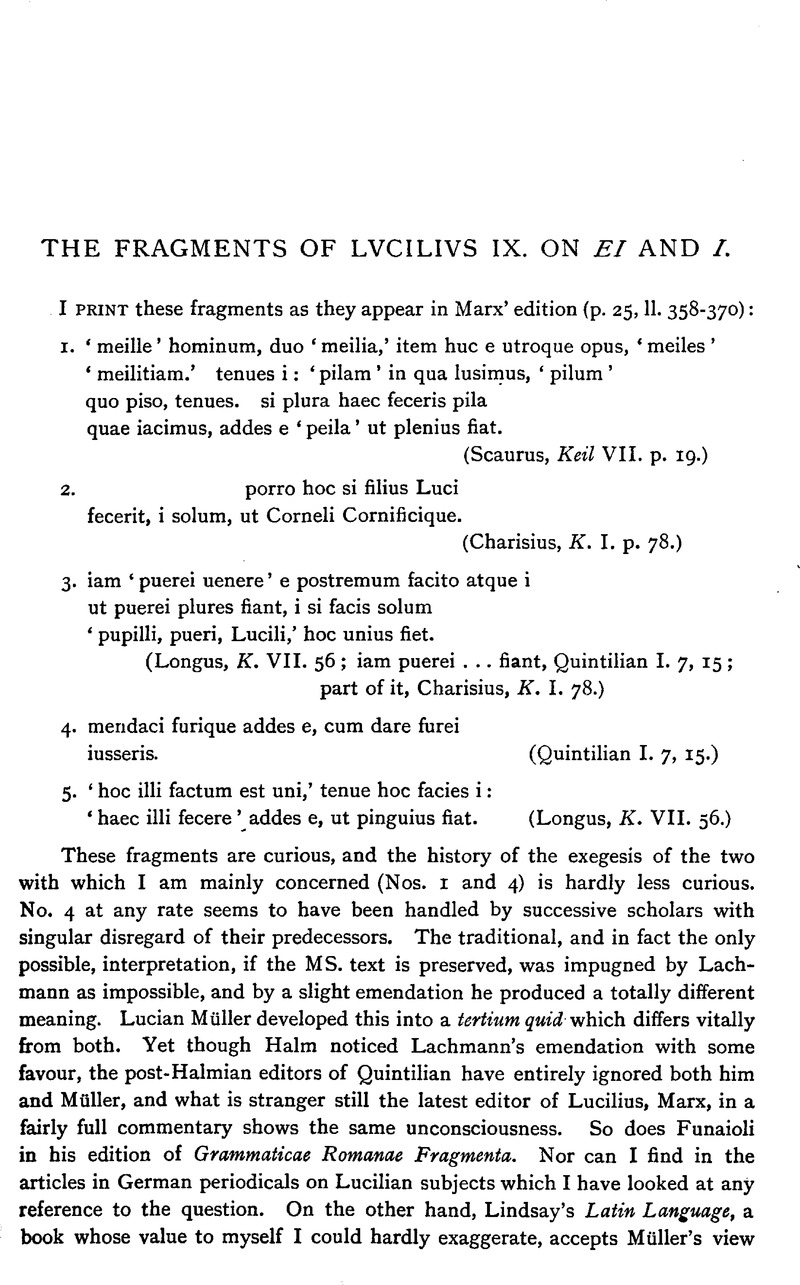Published online by Cambridge University Press: 11 February 2009

page 13 note 1 Müller has ‘tenuest i pilai, qua.’ I believe, however, that the sense needs the actual word ‘pila,’ and the examples quoted by Marx for ‘in qua ludimus’ (lusimus) are fairly adequate. I may here note that ‘huc’ (huce) has often been corrected, but Marx defends it from Plautus, Rud. 726 ‘hue arido argentost opus.’
page 13 note 2 That he ignores ‘“pila” pestles’ need not trouble us. It would not introduce a new type.
page 14 note 1 Müller had at one time approved of Lachmann's ‘datŏ’ from a metrical point of view. I do not know whether his later ‘dabis’ implies any doubts on this point.
page 15 note 1 Following up this suggestion, we might perhaps improve it still further. It may be noted that, while (B) gives a real meaning to the ‘iusseris,’ so meaningless under (A) as it stands, it loses the special force which (A) gives to the verb ‘do’ as introducing the dative. Suppose we were to read ‘cum “dato Furei, ius” erit’ on the analogy of the ‘ius petis’ and ‘ius oras’ of Plautus, we should then get a still grimmer joke, ‘When you say, “pay your dues for once, Furius,” you give the false thief an extra e.’ But I only throw this out as a possible alternative. It may perhaps be said that what it gains on the swings it loses on the roundabouts. It adds force to ‘dato,’ but it loses the ‘iusseris,’ which is really the word on which Lachmann's conjecture was founded. I fear ‘cum … “ius“ seris’ will sound even more fantastic. And yet this sense of ‘sero’ to join words could be easily paralleled.
page 15 note 2 Marx, ib. 353.
page 15 note 3 Longus proceeds (K. VII. 56) to show how numerous these are both in the nouns themselves and between nouns and verbs.
page 16 note 1 It will quite sufficiently satisfy the conditions if it was already practically obsolete in Lucilius' time, or at least so obsolescent that only purists like himself still clung to it.
page 16 note 2 Lindsay indeed was inclined to think that this was the leading idea. Thus he would read ‘meille … miles,’ and supposes ‘pilum’ (sing.) to be contrasted with ‘peila’ (plur.). For the same reason I suppose he suggests ‘date, Furei’ (voc. plur.). But we need not credit Lucilius with what he rightly calls an absurdity, and the doctrine of συμπαθε⋯α quite accounts for the facts.
page 17 note 1 Sprachwissenschaft bei den G. und R. I. p. 351.
page 17 note 2 A still better example would be ‘saeculum’ (not ‘seculum’) for the same reason. But this is from Apuleius' ‘de diphthongo,’ who is said to be of very late date.